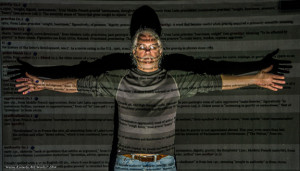Mary Akers: Hi, Tim. Thanks for agreeing to speak with me today. I just loved your essay “Old Colony” in this issue. You do such a nice job, right from the start of grounding us and giving us a wonderful picture of The Old Colony Building with the perfect use of strong sensory details. It’s almost as if you are building a foundation for this essay to come. Preparing us to enter this marvelous old building. Was that by design?
Tim Hillegonds: Yeah, it definitely was. I knew that I wanted to write about the experience with that old man, about how he impacted the room that day, but I just couldn’t figure out a way into the piece. It was so raw when it happened that I think my brain had a hard time putting it into perspective. It wasn’t until I’d started to focus on the building—on the history and the aesthetic details—that I realized the building was the way into the material. Once I shifted my perspective, it started to fall into place.
MA: There is a great paragraph where you write about people reaching back in their minds and then coming forward again. You end that paragraph with the perfect line: “The truth, it seemed, stung us all.” I really like how that hangs in the air. Truth about truth. In the course of telling curious people what our journal is about, I often say, “We’re all recovering from something.” I think your sentence speaks to that same idea. Would you agree?
TH: Absolutely. At the core of recovery—regardless of what that recovery is from—lies the very scary, yet very real, idea of accepting the truth of one’s situation. The old man in Old Colony was faced with the truth of what seems to me to be a pretty rough predicament—he could potentially die before he had a chance to rectify his wrongs. But somehow he found freedom by accepting the truth of his situation. It seems to me that acceptance of truth is one way to mitigate the fear of the unknown, to take away the power that fear can sometimes have over us.
MA: Yes. Acceptance of truth to mitigate fear. I like that. And another one of the things I really like about this essay is how it all turns halfway through. I feel like life is full of these amazing turning points. Sometimes we pretend they didn’t happen and go on as usual, stubbornly refusing to be shaken. But other times we allow them in and they take up this crazy place of importance in our lives–they divide everything we know in a before-and-after way. Would you care to comment on that idea?
TH: This particular situation was definitely one of those turning points for me. When I left Old Colony that day and walked across Chicago’s Loop, my head studying the cracks in the sidewalk while taxicabs honked past me, I remember feeling a profound sense of responsibility. To myself. To my loved ones. To that man. If he could be so noble as to face his mortality in a room full of strangers, and do so with such humility and dignity, then who was I to complain about my life, or to not do all I could to live with intention? My entire worldview took a spin on its axis that day.
MA: Brilliant. I wonder if he had any idea of the long-term effect his words would have. I like to think so.
I was responsible for picking the art for this issue, selecting from Wiley Quixote’s wonderful body of work. And many times in the selection process, there isn’t a logical choice of image to illustrate a particular piece of writing, but at those times my gut usually steps forward and says THAT ONE in a way that I can’t ignore. Such was the case with the image I chose for your essay. It spoke to me. And I’m amazed at how often an image I select will have some special resonance with the author, too–something I couldn’t have known. What did you think of the artwork used to illustrate Old Colony?
TH: It’s a haunting image to me. The words projected across the man’s body, arms outstretched—it reminded me a lot of what addictions do to people. So many folks, before they find recovery, lose all the components of their identity except for whatever is afflicting them. The image actually has the definitions of the words “aggravation” and “authority” in there. Pretty fitting for me since those two words came up plenty of times in my own recovery.
MA: Nice. I love learning about these serendipitous connections. And finally, since we are a recovery-themed journal, what does “recovery” mean to you?
TH: I heard a guy once say, “Direction, not intention, determines destination.” “Recovery” for me means that I’m finally facing the direction I’ve wanted to be facing for a long time. And I have to say, it feel pretty damn good.



When I got here I had my own coffee cup and ashtray. I was patted on the back and told to listen. I did. Bob S., Kenny M., Kenny P., Chuck S., Eddie G., Jack M., John Y. All gone now. But I learned to speak. Today when I speak you can hear them. You may never have met them, but now you know them. So to die sober or to die drunk, silent and forgotten. Not a much of a choice for me. Nor for your friend.
Pingback: Old Colony | Rkvry Quarterly Literary Journal